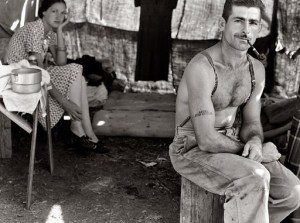 By Gaye Levy
By Gaye Levy
Contributing Writer for Wake Up World
There is a poem by Margaret Jang that begins “To know your future, you must know your past”. And such it is with the events of today and the Great Depression.
The more I learn, the more I want to know because after all, while the Powers That Be and the mainstream media report that the economy is once again growing and things are looking just swell, a walk down Main Street paints a very different picture. In communities across the country, people are still unemployed (or underemployed), they are still being forced out of their homes, and they are still going hungry.
Books, films, newspaper accounts and personal journals all contribute to our knowledge of the events that caused the market crash of 1929 and the Great Depression that followed. I find myself devouring them all so that I can learn and prepare for the hard times ahead. My favorites, however, are the personal stories from those who lived through it.
To that end, I recently was given permission from Backwoods Home Magazine to share a a first hand recollection of times during the Great Depression. Before I do that, however, I want to share with you 10 facts about the Great Depression that we should keep front and center as we move deeper into this next era of economic woes.
10 Facts About the Great Depression
1. The Great Depression did not happen overnight.
2. The media created panic and chaos with their sensationalized reports, creating uncertainty in the market.
3. Being poor was so common that being poor was considered “normal”.
4. Hard work and an enterprising attitude made a bad situation tolerable.
5. Investing time and energy in gardening and the raising of livestock (chickens and cows) had a huge payback in self-reliance.
6. Canning and preserving food was important if you wanted food to eat year-round.
7. The price of everything escalated on an almost daily basis.
8. Lawlessness was rampant. In addition to ruthless outlaws, neighbors stole from neighbors everything from food items to livestock to valuables such as jewelry and tools.
9. In spite of everything, “Robin Hoods” emerged from unexpected places to help feed the people.
10. Families learned to make do and to enjoy themselves with amusements and hobbies that took little or no money.
11. And perhaps the biggest lesson, use it up, wear it out, make do, or do without!
Recalling the Great Depression
The follow excerpt is from Alice B. Yeager’s “The Great Depression: A Reminiscence” and speaks to a time when things were both tough and good at the same time.
I was a girl of 8 when the stock market crashed in 1929. It was the Great Depression, and unless you were living during the Depression years, you can’t really understand how tough they were. Our parents knew, however, as they went about trying to raise families under the worst of economic circumstances.
The Great Depression didn’t happen overnight. There is no way you can select a certain day and say that’s when it began. It started coming on sometime during the late 1920s and lasted well into the 1930s. At its peak, approximately 25 percent of American workers were without jobs. Chaos reigned as banks and insurance companies failed. Worst of all, with no bank deposits federally insured, many people lost their savings unless they were among the first to draw their money out of the banks before they closed their doors.
Newspaper headlines didn’t help matters. In New York City and other hard-hit cities, some moneyed and distraught people were jumping from tall buildings and there was an endless list of businesses closing day by day putting more and more people out of work.
Even though my husband, James, and I were children, we were old enough to be aware of The Great Depression and the effect it had on our families and everyone around us. However, let me say from the outset that being in the same boat with many other Americans made it bearable.
We didn’t realize that we were poor as we were all trying to make ends meet and somehow survive.
~ By Alice B. Yeager and James O. Yeager
You can read the rest of the article on the Backwoods Home Magazine website.
The Final Word
Part of my responsibility is to seek out information that will help us prepare and to cope for hard times ahead. In doing so, I try to keep in mind that all is not doom and gloom.
To quote Alice:
The Great Depression was not all doom and gloom. There were good times, too. Many of us enjoyed going to our favorite fishing holes not only for the outing, but the fish helped to stretch our food budgets. We had very few concrete swimming pools, so we swam in unpolluted creeks and rivers.
Folks were more inclined to gather and play games like checkers, dominoes, and card games. Churches had better attendance than now. Children weren’t encouraged to grow up so fast. They played hopscotch, jumped rope, twirled tops, and did tricks with yo-yos. Older boys and girls played basketball, baseball, softball, skated, etc. There was more physical activity then than playing computer games today, and obesity was not a nationwide problem.
And, so it went. Ordinary Americans managing to get through tough times.
Enjoy your next adventure through common sense and thoughtful preparation!
Gaye
Further articles by Gaye Levy:
- Survival Medicine: Insect Bits and Stings
- Nifty Things Your Grandmother Knew
- Cooking Lessons from the Great Depression
- Six Ways to Get Ready for Going Off-Grid
- DIY Miracle Healing Salve
- The Powerful Healing Qualities of Rosemary Essential Oil
- 15 Alternative Uses for Honey
- Vermiculture: How To Build A Worm Bin the Cheap and Easy Way
- Spices for the Survival Pantry
- 21 Home Remedies for a Toothache Emergency
- The Miracle of Tea Tree Oil: 80 Amazing Uses for Survival
- 10 Simple Steps Toward Self-Sufficiency
- Creating a Healing Garden: 9 Healing Herbs You Can Grow Yourself
About the author:
 Gaye Levy, also known as the Survival Woman, grew up and attended school in the Greater Seattle area. After spending many years as an executive in the software industry, she started a specialized accounting practice offering contract CFO work to emerging high tech and service industries. She has now abandoned city life and has moved to a serenely beautiful rural area on an island in NW Washington State.
Gaye Levy, also known as the Survival Woman, grew up and attended school in the Greater Seattle area. After spending many years as an executive in the software industry, she started a specialized accounting practice offering contract CFO work to emerging high tech and service industries. She has now abandoned city life and has moved to a serenely beautiful rural area on an island in NW Washington State.
Through her website at BackdoorSurvival.com, Gaye lives and teaches the principles of a sustainable and self-reliant lifestyle, speaking her mind and delivering her message of prepping with optimism and grace, regardless of the uncertain times and mayhem swirling around us. Gaye is also the author of 2 kindle books, The Prepper’s Guide to Food Storage and 11 Steps to Living a Strategic Life, available now on Amazon.com
You can find Gaye through her website BackdoorSurvival.com, on Facebook, Twitter and Pinterest.
If you have not done so already, please be sure to like Gaye’s Facebook page, which is updated every time there is an awesome new article, news byte, or link to a free survival, prepping or homesteading book on Amazon. In addition, when you sign up to receive Gaye’s email updates you will receive a free, downloadable copy of her e-book The Emergency Food Buyer’s Guide.

If you've ever found value in our articles, we'd greatly appreciate your support by purchasing Mindful Meditation Techniques for Kids - A Practical Guide for Adults to Empower Kids with the Gift of Inner Peace and Resilience for Life.
In the spirit of mindfulness, we encourage you to choose the paperback version. Delve into its pages away from screen glare and notifications, allowing yourself to fully immerse in the transformative practices within. The physical book enriches the learning process and serves as a tangible commitment to mindfulness, easily shared among family and friends.
Over the past few years, Wake Up World has faced significant online censorship, impacting our financial ability to stay online. Instead of soliciting donations, we're exploring win-win solutions with our readers to remain financially viable. Moving into book publishing, we hope to secure ongoing funds to continue our mission. With over 8,500 articles published in the past 13 years, we are committed to keeping our content free and accessible to everyone, without resorting to a paywall.






